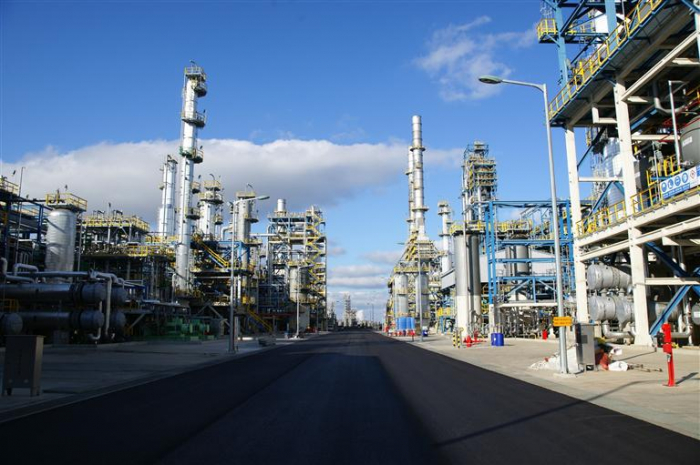Hyundai unveils Korea’s first heavy-feed petrochemical plant
The facility became the world’s seventh HPC after Shell’s six such facilities
By Oct 12, 2022 (Gmt+09:00)
Samsung steps up AR race with advanced microdisplay for smart glasses


When in S. Korea, it’s a ritual: Foreigners make stops at CU, GS25, 7-Eleven


Maybe Happy Ending: A robot love story that rewrote Broadway playbook


NPS yet to schedule external manager selection; PE firms’ fundraising woes deepen


US auto parts tariffs take effect; Korea avoids heavy hit



Hyundai Chemical Co. on Wednesday held an official ceremony of completion of South Korea’s first heavy-feed petrochemical complex (HPC), designed to use low-cost feedstock to boost cost competitiveness.
The 6:4 joint venture between refiner Hyundai Oilbank Co. and Lotte Chemical Corp. had spent about 3 trillion won ($2.1 billion) to build the world’s seventh HPC in Daesan, South Chungcheong Province, about 90 km southwest of Seoul.
Unlike the traditional naphtha cracking centers that use naphtha and liquified petroleum gas as feedstock, HPCs can utilize low-cost base materials such as residual oil and by-product gas.
Hyundai Chemical plans to produce 850,000 tons of ethylene and 500,000 tons of propylene per year from the new complex, alongside other basic materials for petrochemical products. The plant is expected to create 1,500 jobs.
Of its total output, 1.15 million tons of such products will be shipped abroad to generate 3.8 trillion won in revenue.

The HPC, built on reclaimed land in Daesan, will improve the cost competitiveness for both Hyundai Chemical and South Korea’s petrochemical industry as a whole, said the Ministry of Trade, Industry and Energy.
To clear the way for the HPC's operations, the ministry allowed Hyundai Oilbank and Hyundai Chemical to put low-cost feedstock, including oil derived from plastic waste, into their production process in September 2021 and February of this year, respectively.
Both companies belong to the Hyundai Heavy Industries Group.
Meanwhile, Hyundai Chemical’s second shareholder Lotte Chemical said on Tuesday that it has agreed to buy a majority of Iljin Materials Co., a major battery materials supplier, for 2.7 trillion won.
Write to Seo-woo Jang at suwu@hankyung.com
Edited by Yeonhee Kim
-

-
 Corporate investmentLG Electronics breaks ground on $600 mn home appliance plant in India
Corporate investmentLG Electronics breaks ground on $600 mn home appliance plant in India14 HOURS AGO
-

-
 E-commerceCoupang’s Q1 revenue up; quarterly dip signals rising competition
E-commerceCoupang’s Q1 revenue up; quarterly dip signals rising competitionMay 07, 2025 (Gmt+09:00)
-
 Asset managementKorea Investment & Securities deepens global ties with 2nd IR in New York
Asset managementKorea Investment & Securities deepens global ties with 2nd IR in New YorkMay 07, 2025 (Gmt+09:00)


